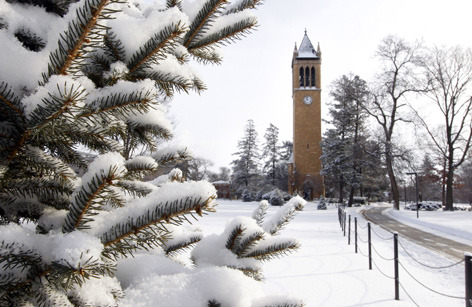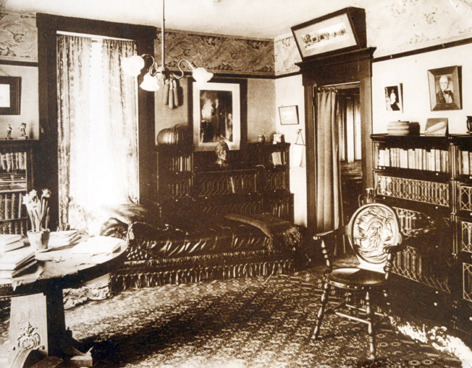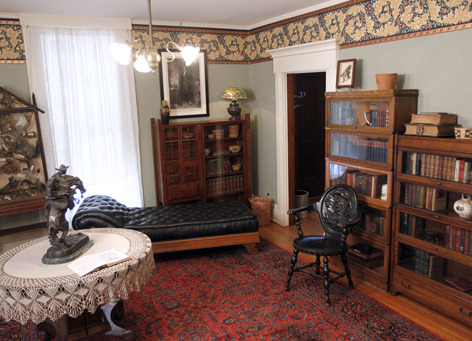A quiet place

Monday's 7.5-inch snowfall contributed to a picturesque central campus Tuesday, preserved in tranquility by arctic air and windchill readings below zero. All that should change by Monday, when students return for the start of spring semester and daytime temperatures return to the 20s. Photo by Christopher Gannon.
Enrollment challenges: Ideas that worked
Testing center lines are shorter. Student health can accommodate more patients. And there should be space for everyone who wants to live in university-owned housing next fall.
Across the university, units are making headway in efforts to meet the challenges accompanying six consecutive years of record enrollment.
"These successes stem from the efforts of many university work groups, such as the president's Student Experience Enhancement Council and students, who've consistently provided useful input and suggestions," said associate vice president and chief of staff Miles Lackey. "We're making good progress and we'll keep at it. The goal is to improve the student experience at Iowa State and we'll always be looking for new ways to do that."
Here's a recap of current and future projects intended to enhance student experiences.
University housing is ready for more
The department of residence housed a record 12,470 students during fall semester by leasing off-campus facilities and converting 400-plus den spaces to temporary student rooms. Some students liked den living so much they asked to stay put, so residence stretched their leases through the end of fall semester. In Linden and Maple halls, where there's more common space for students, happy den dwellers will be allowed to stay put through spring semester.
Residence director Pete Englin said university housing requests are expected to exceed permanent capacity by 1,800 beds next year. However, he anticipates that by using some dens (fewer than this year) and leasing off-campus facilities, the department of residence will be able to accommodate everyone who meets the March 1 contract deadline.
Englin attributes the popularity of university housing to higher grade-points earned by residents, the sense of community, numerous leadership opportunities and student-friendly contracts that release students for study abroad or practicums in other cities.
Student health beefs up medical staff
Earlier this week, Dr. Lisa Banitt, an OB-GYN specialist, joined the Thielen Health Center, where she'll be focusing on providing women's healthcare services. In addition, the clinic recently hired two nurse practitioners who are now fully acclimated and will be expanding their patient loads. Finally, the clinic is close to adding a triage nurse to help manage and assess the increasing volume of incoming calls.
It's all part of a short-term effort to increase the center's capacity to handle more patients, said associate vice president for student affairs and interim director Martino Harmon.
As part of long-term planning, officials are examining the current health center hours of operation and patient visits with an eye to improving efficiency. Currently, the health center is open 8 a.m. to 6 p.m. Mondays; 8 a.m. to 5 p.m. Tuesdays through Fridays; and 9 a.m. to noon Saturdays. During the most recent dead week, traditionally a stressful time for students cramming for finals, the clinic extended all weekday hours to 6 p.m.
Transforming the testing centers
In late October, at a forum sponsored by the Government of the Student Body, several students complained about long lines at online testing centers.
"Administrators and staff from the College of Liberal Arts and Sciences, Engineering-LAS Online Learning (which includes the ISU Test Center), information technology services and the provost’s office went to work on the problem, and within six weeks, they transformed the testing center process. Their solutions involved adding three days to the traditional five-day finals week schedule; doubling the number of testing locations to eight; installing web cams at all sites so students could check lines; and putting college and information technology staff on standby during test periods so technical issues could be quickly addressed.
When finals week rolled around in mid December, most students sailed into test centers with nary a wait.
"I'm proud of the way so many people came together to solve one of students' most pressing concerns,” said senior vice president and provost Jonathan Wickert. “I'm especially appreciative of the GSB, who not only identified the issue as a top concern, but also worked closely with us to identify solutions and get the word out to students.
"Thanks to their efforts, we were able to deliver a record number of exams, with no lines, and ease the stress that comes with finals week."
The testing center team will launch a process improvement project in early 2015 to sustain its success and accommodate future growth in exam volume. Plans also are being finalized for a third permanent testing center to help manage demand during other times, including midterm exams.
Osborn congestion
On any given weekday, thousands of pedestrians, skateboarders and bicyclists, 725 CyRide buses and assorted parked cars co-mingle on central campus' Osborn Drive. As enrollment increases, so does the congestion on the ever-busy street. Analyses of Osborn traffic and congestion recently were conducted by College of Design students and an outside consultant.
Several groups (the University Traffic Committee, GSB and CyRide Board) are poring over those studies and plan to provide recommendations to ease Osborn congestion, said senior vice president for business and finance Warren Madden. Street modifications under consideration include:
- Widening sidewalks on the north side of Osborn
- Removing short-term parking on the street
- Moving bus routes to outside lanes
- Preventing service and delivery vehicles from entering the gated central campus area during class change periods
- Adding more bike paths
Davidson Hall, a fixture on the west end of Osborn Drive for 92 years, will be removed over the next few months. Seventy parking spaces will be added to the former building site.
More spots to sit, study
In December, facilities planning and management staff responded to student requests for more evening study spaces during dead week. Staff opened several classrooms in Carver, Gilman, Howe and Ross halls through 11 p.m. each day.
A long-term plan under consideration calls for adding more hallway seating in campus buildings. Associate vice president for facilities Dave Miller said current discussions focus on providing more seats in the hallways of approximately 20 campus buildings that house large classrooms.
CyRide
Five additional buses were added to the CyRide fleet last fall to accommodate additional enrollment. Another three will be put into service when spring semester starts on Monday. Typically, this is the busiest time of year for CyRide, said transit director Sheri Kyras. Officials monitor bus use, she added. When passenger counts on a single bus consistently exceed 60 to 65, another bus is added to the route.
Sidewalk safety in residence halls area
Pedestrian safety is the impetus for a number of changes planned for the Maple-Willow-Larch and Linden residence hall neighborhoods along Beach Road. In response to student concerns, street lights will be installed in the area this spring with additional work (a retaining wall, expanded bus stop area and a new sidewalk on Beach's west side) to follow.
Grants Hub services begin for research faculty and staff
The Grants Hub, a centralized research support unit that will provide a broad range of services to help researchers obtain and manage external funding, launched this week.
First announced in September by the Office of the Vice President for Research, the Grants Hub will work closely with researchers, departments, centers and colleges to ensure researchers have access to resources they need to pursue and manage sponsored funding at all levels.
Register for Jan. 15 workshop
Fundamentals for faculty new to sponsored funding at ISU
In its initial phase, Grants Hub services will be aimed at helping new faculty with their first grant applications and providing project management services for experienced faculty pursuing more challenging proposal opportunities. The hub also will provide basic research administration training.
Response to a need
The Grants Hub is the culmination of discussions with stakeholders across the university to address President Steven Leath's goal to expand Iowa State's research enterprise. Central support for proposal development also was a top-priority recommendation from the president's Committee on Enhancing Institutional Excellence.
"Our researchers have accomplished great things in the past, and with the wealth of talent we have here at Iowa State, I know there is tremendous ability to do even more," Leath said. "The new Grants Hub ensures that our research faculty and staff have the resources and guidance they need to navigate challenging grant solicitations, pursue funding and take their ideas to fruition."
The Grants Hub's initial design was shaped by comments offered last spring at vice president for research Sarah Nusser's listening sessions and numerous conversations with colleges on how best to support their faculty.
Collaboration is key
Grants Hub staff will collaborate with related research support units to help researchers prepare and submit proposals to external funding agencies and manage awards responsibly. The hub has been working with the Office of Sponsored Programs Administration, Sponsored Programs Accounting, Office for Responsible Research, ISU Foundation, Office for Intellectual Property and Technology Transfer, and other key units to set the stage for integrated services.
"To advance research at Iowa State, we need to support all of our faculty, across campus," Nusser said. "Faculty, center directors, department chairs and our college partners offered very good suggestions for reducing administrative burden and enhancing the scholarly productivity of ISU researchers.
"The Grants Hub is using these suggestions to extend existing campus support and increase Iowa State's capacity to seek sponsored funding and engage with new research funding opportunities," she said.
Coming soon: Help desk
The hub's help desk will be launched in the coming weeks. It will serve as a repository of resources and institutional information. Staff also will field questions related to pre- and post-award processes.
The Grants Hub is working on a post-award unit as well, and constructing an institutional database that will be valuable for proposals, such as training grants, that require extensive institution-wide information.
Discussions also are underway for the Grants Hub to institutionalize broader impacts services currently supported by SP@ISU and EPSCoR grants from the National Science Foundation.
Faculty and staff interested in learning more about Grants Hub services may send an email to grantshub@iastate.edu. In serving campus, the research office will work closely with the colleges to ensure that researcher needs are met. By late spring, a website will be available that provides direct access to services and resources.
'Promise' agreement extends college opportunity to King, Moulton students
Iowa State University and the Des Moines Public School District are working with families and neighborhood organizations to make college more accessible and affordable for students at King Elementary and Moulton Extended Learning Center.
President Steven Leath and DMPS chief of human resources Anne Sullivan will sign the “ISU 4U Promise” agreement at 10 a.m. on Tuesday, Jan. 13, at Moulton. Leath made a promise two years ago to students at King and Moulton to help them achieve a college education.
“The ISU 4U Promise embodies Iowa State University’s land-grant principle that a college education should be accessible and affordable. We are pleased to provide these capable students from diverse backgrounds with an opportunity to earn admission to Iowa State and a tuition award to ensure that socio-economic challenges do not interfere with access to a college education. A degree from Iowa State holds great value, and we believe these students will bring great value to our university,” Leath said.
This multifaceted partnership will provide educational and teaching assistance, as well as tuition awards, for the ISU 4U Promise program. To qualify for an award, King and Moulton students must meet the following criteria:
- Meet annual attendance requirements and behavior/disciplinary standards set by DMPS
- Set annual performance goals with a teacher and maintain a portfolio appropriate to grade level
- Submit a letter of interest to Iowa State at the conclusion of 5th grade
Tuition awards will also be based on total enrollment at King or Moulton schools:
- 1 year of enrollment = 20 percent tuition award
- 2 years of enrollment = 40 percent tuition award
- 3 years of enrollment = 60 percent tuition award
- 4 years of enrollment = 80 percent tuition award
- 5+ years of enrollment = 100 percent tuition award
Students who qualify must enroll in coursework during middle and high school necessary to qualify for admission to Iowa State, complete the ACT test as juniors and apply for admission to ISU during the senior year.
“We are fortunate to have many partnerships with Iowa State University that benefit our students, teachers and schools,” DMPS Superintendent Tom Ahart said. “The ISU 4U Promise builds upon that tradition, and will help make the dream of a college education a reality for more of our students.”
More than a financial incentive
Tuition assistance is a major component of the partnership, but the goal is to also build a relationship in which Iowa State and King and Moulton educators and students are learning from each other. Katherine Richardson Bruna, an associate professor of education and project lead for the ISU 4U Promise, says the School of Education is working with principals, teachers, families and neighborhood leaders to develop programming for King, Moulton and organizations that offer after-school activities.
“We want teachers and families to realize their students have a chance to come to Iowa State and start to shift the way they think. In that shift, we want them to ask us for help. For teachers, that might mean assistance with literacy, math or civics. For families, that might mean assistance with the whole college application process,” Richardson Bruna said.
“We want to be a resource for these schools and families and be responsive to their needs. We also want to learn from them about the knowledge they have to offer that can help us prepare more effective educational professionals. It’s not intended to be a prescription or an imposition, it’s a relationship,” she added.
Richardson Bruna says unlike other promise programs, ISU 4U starts talking with students and families about college as early as kindergarten. Instead of targeting only high-achieving students, the program is open to all students at both schools. There are few restrictions so as not to create additional barriers to a college education, Richardson Bruna said.
Eligibility and cost
Students enrolled in King and Moulton starting with the 2013-2014 academic year are eligible for the ISU 4U Promise. The annual cost of awards could range from $1.9 to $2.4 million, based on projections from the ISU Office of Student Financial Aid. Iowa State will utilize both institutional and private funds to support the initiative. King and Moulton students are likely to be eligible to enroll at Iowa State beginning in fall 2017.
More information about the ISU 4U Promise is available at: isu4u.org.
Learn about research fundamentals at Jan. 15 workshop
Research Administration @ ISU
Thursday, Jan. 15 (8:30 a.m.-4 p.m., includes lunch)
Memorial Union Sun Room
Register by Jan. 12
This course is designed for faculty who are new to sponsored funding at ISU. Instructors from the Grants Hub, ISU Foundation and the offices of Responsible Research and Sponsored Programs Administration (OSPA) will explain how to navigate the proposal submission process and manage a research program. Lunch is provided. The following topics will familiarize participants with campus resources available to them.
- Find research funding using subscription databases
- Create a budget and use OSPA-approved templates
- Learn when and how to solicit approval from research compliance boards
- Route proposals for official approval (Gold and Cardinal sheets)
- Submit a funding proposal to a sponsor
- Complete administrative steps after winning an award
Celebrating the Farm House
The Farm House Museum reopens its doors Jan. 12 following a six-month closure for updates and restoration work. On Thursday, Jan. 15, the campus' oldest building will be celebrated with a pair of events, free and open to the public.
As part of the "Preserving a Cultural Legacy" celebration, visitors are invited to tour the restored museum and enjoy light refreshments at a campus open house (noon-4 p.m.). An after-hours event, including refreshments and live music, will be held from 4 to 6 p.m., with free shuttle service available from the parking lot north of the Scheman Building (3:30-6:30 p.m.). Warren Madden, senior vice president for business and finance, and Wendy Wintersteen, dean of the College of Agriculture and Life Sciences, will share remarks at 5:30 p.m.
The restoration work included replacement windows and wallpaper, designed to be historically appropriate. Visitors will find a different look in the house, with rearranged furniture and "recurated" displays. The Farm House, constructed in 1860 as Iowa State's first building, is a national historic monument. Its list of former residents includes Iowa State's first president, Adonijah Welch; President William McKinley's Secretary of Agriculture, "Tama Jim" Wilson; and College of Agriculture dean Charles Curtiss.


A look at the Farm House's library, then and now. Photo by Christopher Gannon, historic photo courtesy of the Farm House Museum.
